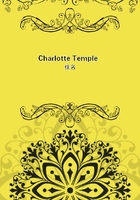
第33章
Mrs. Beauchamp was mild and engaging; she loved not the hurry and bustle of a city, and had prevailed on her husband to take a house a few miles from New-York. Chance led her into the same neighbourhood with Charlotte; their houses stood within a short space of each other, and their gardens joined: she had not been long in her new habitation before the figure of Charlotte struck her;she recollected her interesting features; she saw the melancholy so conspicuous in her countenance, and her heart bled at the reflection, that perhaps deprived of honour, friends, all that was valuable in life, she was doomed to linger out a wretched existence in a strange land, and sink broken-hearted into an untimely grave.
"Would to heaven I could snatch her from so hard a fate," said she;"but the merciless world has barred the doors of compassion against a poor weak girl, who, perhaps, had she one kind friend to raise and reassure her, would gladly return to peace and virtue;nay, even the woman who dares to pity, and endeavour to recall a wandering sister, incurs the sneer of contempt and ridicule, for an action in which even angels are said to rejoice."The longer Mrs. Beauchamp was a witness to the solitary life Charlotte led, the more she wished to speak to her, and often as she saw her cheeks wet with the tears of anguish, she would say--"Dear sufferer, how gladly would I pour into your heart the balm of consolation, were it not for the fear of derision."But an accident soon happened which made her resolve to brave even the scoffs of the world, rather than not enjoy the heavenly satisfaction of comforting a desponding fellow-creature.
Mrs. Beauchamp was an early riser. She was one morning walking in the garden, leaning on her husband's arm, when the sound of a harp attracted their notice: they listened attentively, and heard a soft melodious voice distinctly sing the following stanzas:
Thou glorious orb, supremely bright, Just rising from the sea, To chear all nature with thy light, What are thy beams to me?
In vain thy glories bid me rise, To hail the new-born day, Alas! my morning sacrifice Is still to weep and pray.
For what are nature's charms combin'd, To one, whose weary breast Can neither peace nor comfort find, Nor friend whereon to rest?
Oh! never! never! whilst I live Can my heart's anguish cease:
Come, friendly death, thy mandate give, And let me be at peace.
"'Tis poor Charlotte!" said Mrs. Beauchamp, the pellucid drop of humanity stealing down her cheek.
Captain Beauchamp was alarmed at her emotion. "What Charlotte?"said he; "do you know her?"
In the accent of a pitying angel did she disclose to her husband Charlotte's unhappy situation, and the frequent wish she had formed of being serviceable to her. "I fear," continued she, "the poor girl has been basely betrayed; and if I thought you would not blame me, I would pay her a visit, offer her my friendship, and endeavour to restore to her heart that peace she seems to have lost, and so pathetically laments. Who knows, my dear," laying her hand affectionately on his arm, "who knows but she has left some kind, affectionate parents to lament her errors, and would she return, they might with rapture receive the poor penitent, and wash away her faults in tears of joy. Oh! what a glorious reflexion would it be for me could I be the happy instrument of restoring her.
Her heart may not be depraved, Beauchamp."
"Exalted woman!" cried Beauchamp, embracing her, "how dost thou rise every moment in my esteem. Follow the impulse of thy generous heart, my Emily. Let prudes and fools censure if they dare, and blame a sensibility they never felt; I will exultingly tell them that the heart that is truly virtuous is ever inclined to pity and forgive the errors of its fellow-creatures."A beam of exulting joy played round the animated countenance of Mrs. Beauchamp, at these encomiums bestowed on her by a beloved husband, the most delightful sensations pervaded her heart, and, having breakfasted, she prepared to visit Charlotte.